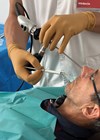Paediatric ENT is often considered the ‘Cinderella’ subspeciality within otolaryngology. There are efforts in the UK and overseas to redress the balance.
Paediatric ENT is a specialised field that addresses the unique needs of children with otolaryngological disorders. Despite its importance, there is a shortage of professionals in this area attributed to several factors including an ageing workforce, difficulties in recruitment and retention, and a limited number of training positions.
The demand for paediatric ENT services continues to grow, driven by increasing awareness of children’s health needs. In March 2024, ENT UK published that the ENT operating waiting list stands almost at 70,000 with 40% consisting of children and young adults, mostly waiting for tonsillectomy. Three thousand are waiting more than a year for surgery.
To foster a new generation of paediatric ENT specialists, we feel several strategies need to be employed, focusing on awareness, mentorship, clinical exposure, research opportunities, networking and clear career pathways. Across ENT, many subspeciality groups have formed ‘junior’ societies and, over the last two years, we have formed BAPOJ (an offshoot of British Association of Paediatric Otolaryngology) to highlight, focus and significantly enhance these efforts. Similar groups are available across Europe (Young ESPO) and Internationally (YO-IFOS).

Raising awareness about paediatric ENT is crucial in encouraging trainees to consider this specialty. Educational campaigns can highlight the diverse conditions treated in paediatric ENT, from chronic ear infections to complex airway management. Resources from BAPO, including guidelines and educational materials, can serve as effective tools in these campaigns. BAPOJ has hosted teaching webinars on interesting topics such as cleft palate management and subglottic stenosis with laryngotracheal reconstruction. Our European colleagues, ESPO, also hold similar online educational courses; for example, a recent two-part course on paediatric otology, understanding the diagnosis and treatment of ear conditions in children. By promoting the significance of early diagnosis and intervention in paediatric populations, awareness initiatives can spark interest among medical students and resident doctors.
Mentorship plays a vital role in shaping career choices in medicine. Establishing mentorship programmes that connect trainees with experienced paediatric ENT specialists can provide invaluable insights into the field. These relationships can help demystify the complexities of paediatric otolaryngology and showcase the rewarding aspects of working with children. We hope BAPOJ can facilitate mentorship connections through networking events and online platforms, allowing trainees to engage with professionals worldwide, fostering an international perspective on paediatric ENT practices.
Increased clinical exposure is essential for trainees to develop a genuine interest in paediatric ENT. In an ideal world, medical schools and training programmes should incorporate structured rotations in paediatric otolaryngology, allowing students to observe and participate in procedures and patient care. However, we know some junior trainees often have no or minimal ENT exposure. Many practical courses now provide opportunities for trainees to further their clinical knowledge and skills, with examples including British Paediatric Otolaryngology Course (BPOC), National Practical Course in Paediatric Otolaryngology (NPCPO) and BAPO Airway Trainee Skills Course (BATS).
Providing a contact point for interested trainees, for example with BAPOJ, we hope we can help facilitate observerships or study days with hospitals that specialise in paediatric care that can enhance these opportunities. Furthermore, international electives and fellowships can expose trainees to diverse healthcare systems and practices in paediatric ENT, broadening their horizons and enriching their training experiences. Our BAPOJ website provides a brilliant summary of many senior clinical fellowships with reviews from current or recent fellows. Young ESPO offers observership travel grants and BAPOJ has a travelling fellowship grant of up to £1000 to contribute towards a paediatric otolaryngology fellowship in the UK or abroad.
Engaging in research can deepen a trainee’s understanding of paediatric ENT and its complexities. Institutions should encourage participation in research projects which may focus on common paediatric ENT conditions, such as otitis media or sleep-disordered breathing. BAPOJ supports various research initiatives and offers a £1500 prize towards a paediatric otorhinolaryngology-based research project. BAPO is also exploring further research prize opportunities including sustainability projects. International collaboration in research can also open doors for sharing knowledge and innovative approaches, ultimately improving patient care. Our worldwide paediatric ENT consultant WhatsApp group often sparks interesting topic discussions and has been influential in several publications!
Networking events are vital for building professional relationships and fostering interest in paediatric ENT. Conferences, seminars and workshops organised by BAPO and other international organisations, such as ESPO and CEORL, can serve as platforms for trainees to meet leading experts in the field. These events can showcase advancements in paediatric ENT and provide insights into career opportunities. Encouraging participation in international conferences allows trainees to gain a global perspective and understand the nuances of paediatric ENT practices across different cultures and healthcare systems. Oral and poster presentation prizes from conferences also often come with monetary and CV rewards!
The field of paediatric ENT is vital for the health and wellbeing of children, yet it often faces challenges in attracting new talent. By implementing strategies focused on awareness, mentorship, clinical exposure, research opportunities and networking, we can cultivate a robust pipeline of paediatric ENT specialists. Collaborations with organisations like BAPOJ and embracing international best practices can enhance these efforts, ensuring that the next generation of doctors is well-equipped to meet the needs of paediatric patients. Through concerted action, we can inspire a renewed interest in this essential specialty, ultimately benefiting children and families worldwide.
Declaration of competing interests: None declared.









